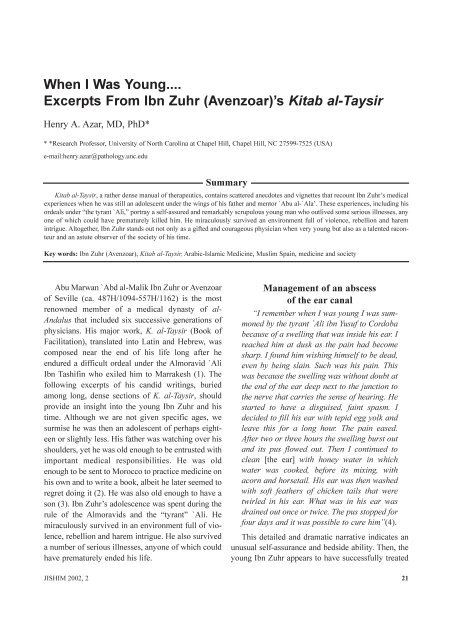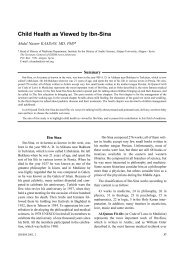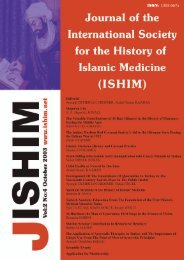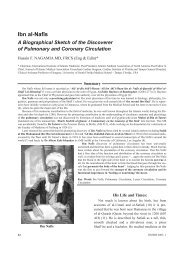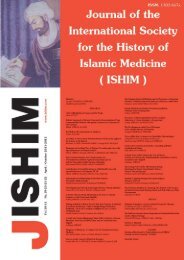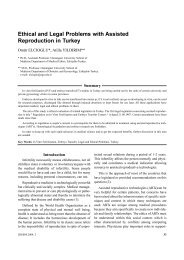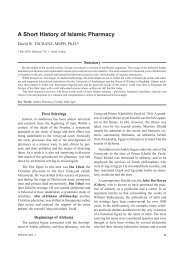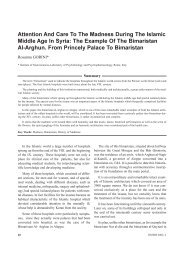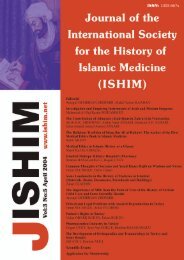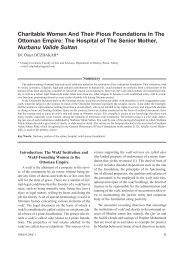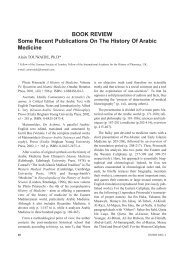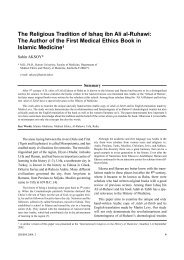s Kitab al-Taysir - International Society for the History of Islamic ...
s Kitab al-Taysir - International Society for the History of Islamic ...
s Kitab al-Taysir - International Society for the History of Islamic ...
Create successful ePaper yourself
Turn your PDF publications into a flip-book with our unique Google optimized e-Paper software.
When I Was Young....<br />
Excerpts From Ibn Zuhr (Avenzoar)’s <strong>Kitab</strong> <strong>al</strong>-<strong>Taysir</strong><br />
Henry A. Azar, MD, PhD*<br />
* *Research Pr<strong>of</strong>essor, University <strong>of</strong> North Carolina at Chapel Hill, Chapel Hill, NC 27599-7525 (USA)<br />
e-mail:henry.azar@pathology.unc.edu<br />
Summary<br />
<strong>Kitab</strong> <strong>al</strong>-<strong>Taysir</strong>, a ra<strong>the</strong>r dense manu<strong>al</strong> <strong>of</strong> <strong>the</strong>rapeutics, contains scattered anecdotes and vignettes that recount Ibn Zuhr’s medic<strong>al</strong><br />
experiences when he was still an adolescent under <strong>the</strong> wings <strong>of</strong> his fa<strong>the</strong>r and mentor `Abu <strong>al</strong>-`Ala’. These experiences, including his<br />
orde<strong>al</strong>s under “<strong>the</strong> tyrant `Ali,” portray a self-assured and remarkably scrupulous young man who outlived some serious illnesses, any<br />
one <strong>of</strong> which could have prematurely killed him. He miraculously survived an environment full <strong>of</strong> violence, rebellion and harem<br />
intrigue. Altoge<strong>the</strong>r, Ibn Zuhr stands out not only as a gifted and courageous physician when very young but <strong>al</strong>so as a t<strong>al</strong>ented raconteur<br />
and an astute observer <strong>of</strong> <strong>the</strong> society <strong>of</strong> his time.<br />
Key words: Ibn Zuhr (Avenzoar), <strong>Kitab</strong> <strong>al</strong>-<strong>Taysir</strong>, Arabic-<strong>Islamic</strong> Medicine, Muslim Spain, medicine and society<br />
Abu Marwan `Abd <strong>al</strong>-M<strong>al</strong>ik Ibn Zuhr or Avenzoar<br />
<strong>of</strong> Seville (ca. 487H/1094-557H/1162) is <strong>the</strong> most<br />
renowned member <strong>of</strong> a medic<strong>al</strong> dynasty <strong>of</strong> <strong>al</strong>-<br />
And<strong>al</strong>us that included six successive generations <strong>of</strong><br />
physicians. His major work, K. <strong>al</strong>-<strong>Taysir</strong> (Book <strong>of</strong><br />
Facilitation), translated into Latin and Hebrew, was<br />
composed near <strong>the</strong> end <strong>of</strong> his life long after he<br />
endured a difficult orde<strong>al</strong> under <strong>the</strong> Almoravid `Ali<br />
Ibn Tashifin who exiled him to Marrakesh (1). The<br />
following excerpts <strong>of</strong> his candid writings, buried<br />
among long, dense sections <strong>of</strong> K. <strong>al</strong>-<strong>Taysir</strong>, should<br />
provide an insight into <strong>the</strong> young Ibn Zuhr and his<br />
time. Although we are not given specific ages, we<br />
surmise he was <strong>the</strong>n an adolescent <strong>of</strong> perhaps eighteen<br />
or slightly less. His fa<strong>the</strong>r was watching over his<br />
shoulders, yet he was old enough to be entrusted with<br />
important medic<strong>al</strong> responsibilities. He was old<br />
enough to be sent to Morocco to practice medicine on<br />
his own and to write a book, <strong>al</strong>beit he later seemed to<br />
regret doing it (2). He was <strong>al</strong>so old enough to have a<br />
son (3). Ibn Zuhr’s adolescence was spent during <strong>the</strong><br />
rule <strong>of</strong> <strong>the</strong> Almoravids and <strong>the</strong> “tyrant” `Ali. He<br />
miraculously survived in an environment full <strong>of</strong> violence,<br />
rebellion and harem intrigue. He <strong>al</strong>so survived<br />
a number <strong>of</strong> serious illnesses, anyone <strong>of</strong> which could<br />
have prematurely ended his life.<br />
Management <strong>of</strong> an abscess<br />
<strong>of</strong> <strong>the</strong> ear can<strong>al</strong><br />
“I remember when I was young I was summoned<br />
by <strong>the</strong> tyrant `Ali ibn Yusuf to Cordoba<br />
because <strong>of</strong> a swelling that was inside his ear. I<br />
reached him at dusk as <strong>the</strong> pain had become<br />
sharp. I found him wishing himself to be dead,<br />
even by being slain. Such was his pain. This<br />
was because <strong>the</strong> swelling was without doubt at<br />
<strong>the</strong> end <strong>of</strong> <strong>the</strong> ear deep next to <strong>the</strong> junction to<br />
<strong>the</strong> nerve that carries <strong>the</strong> sense <strong>of</strong> hearing. He<br />
started to have a disguised, faint spasm. I<br />
decided to fill his ear with tepid egg yolk and<br />
leave this <strong>for</strong> a long hour. The pain eased.<br />
After two or three hours <strong>the</strong> swelling burst out<br />
and its pus flowed out. Then I continued to<br />
clean [<strong>the</strong> ear] with honey water in which<br />
water was cooked, be<strong>for</strong>e its mixing, with<br />
acorn and horsetail. His ear was <strong>the</strong>n washed<br />
with s<strong>of</strong>t fea<strong>the</strong>rs <strong>of</strong> chicken tails that were<br />
twirled in his ear. What was in his ear was<br />
drained out once or twice. The pus stopped <strong>for</strong><br />
four days and it was possible to cure him”(4).<br />
This detailed and dramatic narrative indicates an<br />
unusu<strong>al</strong> self-assurance and bedside ability. Then, <strong>the</strong><br />
young Ibn Zuhr appears to have successfully treated<br />
JISHIM 2002, 2<br />
21
Henry A. Azar<br />
WHEN I WAS YOUNG....<br />
EXCERPTS FROM IBN ZUHR (AVENZOAR)’S KÝTAB AL-TAYSÝR<br />
a excruciatingly painful and delicate lesion <strong>of</strong> <strong>the</strong> ear<br />
can<strong>al</strong>. It is quite possible that he was simply <strong>for</strong>tunate<br />
to arrive at a time when this apparent abscess was<br />
ready to burst out spontaneously. He stated on more<br />
than one occasion that medicine was guess and intuition<br />
(5). He should have <strong>al</strong>so added <strong>the</strong> important<br />
ingredient <strong>of</strong> luck.<br />
A case <strong>of</strong> “obsession”<br />
“I remember, when I was a youth practicing<br />
medicine under <strong>the</strong> supervision <strong>of</strong> my fa<strong>the</strong>r,<br />
God have mercy on him, I was c<strong>al</strong>led one day<br />
upon his recommendation to [treat] Tamim,<br />
bro<strong>the</strong>r <strong>of</strong> <strong>the</strong> tyrant `Ali, and he was <strong>the</strong> governor<br />
<strong>of</strong> Seville. I found him pretending he was<br />
dead and unable to speak, not even to move<br />
from place to place. His pulse did not indicate<br />
anything <strong>of</strong> <strong>the</strong> sort, except that he had a disturbance<br />
<strong>of</strong> a hot temperament or a hot humor<br />
in his stomach. I made him drink rose water<br />
and apple juice with some mint water, and<br />
crushed in it sand<strong>al</strong>wood and mastic. His condition<br />
improved. Then I visited him ano<strong>the</strong>r<br />
day with my fa<strong>the</strong>r, God have mercy on him,<br />
and he was in his [<strong>for</strong>mer] state <strong>of</strong> obsession. I<br />
had to stay and be quartered with him. His<br />
condition at times improved and at o<strong>the</strong>r times<br />
worsened. It occurred to me that this was due<br />
to an intrusion (an extern<strong>al</strong> factor). We<br />
remained not knowing what caused this until I<br />
asked one night <strong>for</strong> water [<strong>for</strong> him] to drink. It<br />
was poured from <strong>the</strong> vessel Tamim drank from.<br />
I found <strong>the</strong> water to have a foul taste, with a<br />
barely discernible fragrance and unpleasant<br />
odor, that I deplored. I did not drink from it<br />
and I could not but shout: “How would he get<br />
cured and you are making him drink something<br />
that is destroying him and what is this” One<br />
<strong>of</strong> his slaves warned me but I could not remain<br />
silent. I continued to speak out. The anger <strong>of</strong><br />
his wife Hawwa and <strong>of</strong> her servants became<br />
apparent. This led to my slander and humiliation,<br />
but <strong>al</strong>l this did not stop me <strong>for</strong> telling <strong>the</strong><br />
truth. Some friends advised me to be silent and<br />
recover my good <strong>for</strong>tune, but I considered this<br />
a <strong>for</strong>m <strong>of</strong> fraudulence and I did not resort to it.<br />
It was found later that he was made to drink<br />
dried meat that had rotted in <strong>the</strong> worst way;<br />
dried and minced <strong>the</strong>n <strong>for</strong>cefully introduced<br />
into <strong>the</strong> vessel. The observant physician would<br />
have known that <strong>the</strong> bad meat had putrefied<br />
and dried and that putrefaction can cause<br />
havoc. As long as <strong>the</strong> man had this in his stomach<br />
and its surroundings, bad vapors would<br />
ascend to his brain causing him to be<br />
obsessed. All <strong>the</strong> physicians <strong>the</strong>n in <strong>the</strong> city,<br />
who attended him, failed in <strong>the</strong>ir treatment and<br />
cure. He did not get well until <strong>the</strong> tyrant, his<br />
bro<strong>the</strong>r, deposed him from his position, denied<br />
him from enjoying his revenue and capped <strong>al</strong>l<br />
this evil act by cutting him <strong>of</strong>f from his money.<br />
I saw him after this in Morocco—his bro<strong>the</strong>r<br />
had imprisoned me [<strong>the</strong>re]—and he was weak<br />
[but] without obsession” (6).<br />
Sigmund Freud may have argued whe<strong>the</strong>r<br />
Tamim’s case represented a severe case <strong>of</strong> hypochondria,<br />
neuras<strong>the</strong>nia or hysteria, or whe<strong>the</strong>r, as suggested<br />
by Ibn Zuhr, it was simply a case <strong>of</strong> food poisoning<br />
affecting his ment<strong>al</strong> behavior, a <strong>for</strong>m <strong>of</strong> “intrusion.”<br />
Also <strong>of</strong> note is Ibn Zuhr’s refus<strong>al</strong> to dissimulate<br />
what he believed to be true no matter <strong>the</strong> consequences.<br />
Treatment <strong>of</strong> a hernia<br />
“I saw a man, who was my friend, who had<br />
a hernia that had incapacitated him <strong>for</strong> some<br />
time. I was <strong>the</strong>n in my youth. He had acute<br />
pains that affected <strong>al</strong>l his body and he could<br />
not move except with great difficulty. I continued<br />
to treat him <strong>for</strong> his pains and I <strong>for</strong>bade him<br />
<strong>al</strong>l foods except a bit <strong>of</strong> fermented bread<br />
soaked in a stew <strong>of</strong> white little birds so well<br />
cooked that <strong>the</strong> flesh <strong>of</strong> birds had dissolved in<br />
it. The man remained on his back <strong>for</strong> nearly<br />
twenty days, imagining <strong>the</strong> ritu<strong>al</strong>s <strong>of</strong> prayer<br />
[without actu<strong>al</strong>ly genuflecting]. After this [regimen],<br />
<strong>the</strong> pains tot<strong>al</strong>ly subsided and he was<br />
tot<strong>al</strong>ly cured” (7).<br />
The young Ibn Zuhr resorted in this case to a simple<br />
method, prolonged bed rest and a s<strong>of</strong>t diet, to<br />
manage a painful incarcerated hernia. Here again, <strong>the</strong><br />
physician and his patient had a lot <strong>of</strong> luck on <strong>the</strong>ir<br />
side. Regrettably, we do not have a follow-up.<br />
22 JISHIM 2002, 2
WHEN I WAS YOUNG....<br />
EXCERPTS FROM IBN ZUHR (AVENZOAR)’S KÝTAB AL-TAYSÝR<br />
Henry A. Azar<br />
A case <strong>of</strong> suppurative<br />
chest disease and phlebotomy<br />
“It is possible to manage suppuration as in<br />
my case when I was a youth. I became very<br />
depressed because <strong>of</strong> our bad treatment by `Ali<br />
resulting from a word <strong>for</strong> which he blamed my<br />
old fa<strong>the</strong>r, God had mercy on him. He ordered<br />
that he be avenged in every possible manner. I<br />
developed a most unusu<strong>al</strong> severe depression. I<br />
started behaving in a manner I was not accustomed<br />
to. When I wanted to sleep, I felt prolonged<br />
pain. I did not leave my bed as my condition<br />
worsened and I was seized with a persistent<br />
cough. I found my pulse to be stronger.<br />
During this time I developed an acute fever. I<br />
was referred to a phlebotomist and I was bled<br />
close to <strong>the</strong> next evening about a rotl [more<br />
than a liter] <strong>of</strong> blood. I remained that night in<br />
great distress, feverish and coughing. I was<br />
<strong>for</strong>ced to leave <strong>the</strong> next day and I left riding,<br />
still depressed, filled with terror and apprehension.<br />
I reached <strong>the</strong> place I moved to and,<br />
because <strong>of</strong> fatigue and lack <strong>of</strong> sleep, I fell<br />
asleep and <strong>the</strong> blood started flowing spontaneously<br />
from my arm. When I woke up, I found<br />
myself to be very weak and <strong>the</strong> blood had<br />
spilled over <strong>the</strong> place I was sleeping. I placed<br />
my hand over <strong>the</strong> place [I was bleeding from]<br />
and c<strong>al</strong>led <strong>for</strong> someone to tie my arm. I<br />
remained like this <strong>the</strong> rest <strong>of</strong> <strong>the</strong> day and my<br />
condition remained <strong>the</strong> same. The next morning<br />
I expectorated pus <strong>of</strong> good qu<strong>al</strong>ity and color.<br />
Then I received some news that added to my<br />
fear. My mind got blurred and could not understand<br />
what happened to me. I remained in this<br />
condition not taking care <strong>of</strong> myself and not<br />
t<strong>al</strong>king any me<strong>al</strong>s except <strong>for</strong> some medicated<br />
water. I asked <strong>for</strong> it and I was given it because<br />
my thirst was strong. After seven days I [partly]<br />
recovered my memory. I remained not knowing<br />
who I was and what happened to me, and at<br />
times I somewhat recovered my senses. Then I<br />
started wondering who from my family was taking<br />
care <strong>of</strong> me, [thinking she was] my mo<strong>the</strong>r,<br />
God have mercy on her, until I remembered she<br />
had died. Then I remembered my situation and<br />
asked about what happened to my fa<strong>the</strong>r and<br />
son. I was told <strong>the</strong>y were both in <strong>for</strong>eign lands.<br />
I was saddened and said that <strong>the</strong>y were probably<br />
killed at <strong>the</strong> time when I was beaten on my<br />
chest and was stricken with a blow on my head<br />
because <strong>of</strong> which I could not lift it. Then I<br />
became overcome with terror about `Ali and<br />
feared I would be killed and urged that my condition<br />
be hidden and that no one should know I<br />
was <strong>al</strong>ive. After much ef<strong>for</strong>t and <strong>the</strong> passage <strong>of</strong><br />
many hours <strong>of</strong> time, my confusion stopped. It<br />
was as if part <strong>of</strong> my chest stopped sending to<br />
my head vapors that caused my memory to be<br />
taken over by <strong>the</strong>ir turbulence. One <strong>of</strong> <strong>the</strong> membranes<br />
<strong>the</strong>re had started to swell acutely and<br />
after its swelling I did not grasp anything <strong>of</strong> my<br />
situation. I continued to expectorate pus <strong>for</strong>m<br />
my chest and head and <strong>the</strong> pus run <strong>for</strong>m <strong>the</strong>m<br />
<strong>the</strong> way <strong>of</strong> a catarrh. However, I sensed my situation<br />
and what was <strong>the</strong> cause <strong>of</strong> my illness<br />
after I regained my consciousness. I continued<br />
to treat myself with that water <strong>for</strong> a while and<br />
<strong>the</strong> pus did not stop until it somehow dried up.<br />
I started feeding myself with barley water and<br />
after a long time I started drinking water. Then<br />
I kept on improving little by little until I<br />
returned to my condition” (8).<br />
This complicated story tells about Ibn Zuhr’s<br />
orde<strong>al</strong> under `Ali. He was beaten over <strong>the</strong> chest and<br />
head, developed a purulent upper respiratory infection<br />
that he<strong>al</strong>ed after <strong>the</strong> expectoration <strong>of</strong> a copious<br />
amount <strong>of</strong> pus. We <strong>al</strong>so learn that he was orphaned <strong>of</strong><br />
his mo<strong>the</strong>r and that he had a son when a youth. He<br />
developed shock after phlebotomy followed by addition<strong>al</strong><br />
blood loss from his arm, presumably at <strong>the</strong> site<br />
<strong>of</strong> <strong>the</strong> phlebotomy. This accident did not seem to have<br />
dampened his enthusiasm <strong>for</strong> bloodletting that he continued<br />
to advocate in similar “hot” (sanguinous) and<br />
bilious conditions (9).<br />
Follow G<strong>al</strong>en’s advice<br />
“I saw this condition, when I was young, in<br />
a villager who had drunk some very cold water<br />
when <strong>the</strong> wea<strong>the</strong>r was very hot. His stools<br />
could not come out and he felt a strong pain he<br />
could not bear. The condition baffled me and I<br />
discussed it with physicians who were [<strong>the</strong>re]<br />
at that time. None <strong>of</strong> <strong>the</strong>m provided me with<br />
JISHIM 2002, 2<br />
23
Henry A. Azar<br />
WHEN I WAS YOUNG....<br />
EXCERPTS FROM IBN ZUHR (AVENZOAR)’S KÝTAB AL-TAYSÝR<br />
much except <strong>for</strong> confusion. I w<strong>al</strong>ked to my<br />
fa<strong>the</strong>r, who was <strong>the</strong>n at his land, and in<strong>for</strong>med<br />
him about my quandary asking him to advise<br />
me. He moved his hand to a book and took<br />
from it an excerpt <strong>of</strong> G<strong>al</strong>en he passed to me<br />
telling me to go without adding more. Each<br />
time I would ask him to teach me, he would<br />
say:’ Memorize this page. Be happy if you succeed<br />
in his treatment. And if you were to treat<br />
him differently than this, be careful about<br />
undertaking anything that de<strong>al</strong>s with medic<strong>al</strong><br />
practice.’ I left him reading that excerpt [<strong>of</strong><br />
G<strong>al</strong>en] and repeating it to myself. What I memorized<br />
became clear. I undertook to treat <strong>the</strong><br />
patient accordingly and he was cured. After a<br />
while, I saw my fa<strong>the</strong>r, God have mercy on him.<br />
He asked me [about <strong>the</strong> patient] and I<br />
answered him. He became happy and quit<br />
being angry at me” (10).<br />
Ibn Zuhr was trained under his fa<strong>the</strong>r as an<br />
apprentice. This account shows a glimpse <strong>of</strong> a relationship<br />
that must have been on occasion tense. It<br />
<strong>al</strong>so illustrates <strong>the</strong> importance <strong>of</strong> G<strong>al</strong>enic teaching to<br />
both fa<strong>the</strong>r and son. Next to his fa<strong>the</strong>r Abu <strong>al</strong>-`Ala’,<br />
G<strong>al</strong>en is <strong>the</strong> most frequently quoted authority in <strong>the</strong><br />
<strong>Taysir</strong>.<br />
A poisoned maiden<br />
“The tyrant `Ali ben Yusuf had a maiden by<br />
<strong>the</strong> name <strong>of</strong> Al-Thurayya who developed an<br />
ailment <strong>of</strong> <strong>the</strong> sm<strong>al</strong>l intestine followed by<br />
severe diarrhea and twisting (severe colicky)<br />
pains. He c<strong>al</strong>led <strong>for</strong> me each time she discarded<br />
her medication until this [condition] lasted<br />
<strong>for</strong> over <strong>for</strong>ty days. I was puzzled by her illness<br />
but I had a good idea (I became suspicious)<br />
[about its nature]. The inner coat <strong>of</strong> her<br />
gut had sloughed <strong>of</strong>f entirely—meaning [up to]<br />
<strong>the</strong> place <strong>of</strong> barrenness [anus and glute<strong>al</strong><br />
region]. With <strong>the</strong> diarrhea came out a piece<br />
[<strong>the</strong> sloughed materi<strong>al</strong>] with <strong>the</strong> span <strong>of</strong> more<br />
than two hands. The Slavic [eunuch] in<strong>for</strong>med<br />
me about her. I was amazed about <strong>the</strong> acuteness<br />
<strong>of</strong> <strong>the</strong> humor that led to this and produced<br />
such a great effect so rapidly. Later, I discovered<br />
that Qamar, his [`Ali’s] favorite concubine<br />
and one <strong>of</strong> her entourage, had poisoned<br />
her. There was no doubt about this and she<br />
died <strong>of</strong> this condition. Everything is ordained<br />
and to <strong>the</strong> living much glory” (11).<br />
This is a most in<strong>for</strong>mative report on a case <strong>of</strong><br />
acute poisoning <strong>of</strong> <strong>the</strong> gut. All that is missing is <strong>the</strong><br />
identity <strong>of</strong> <strong>the</strong> potent poison used by <strong>the</strong> je<strong>al</strong>ous<br />
Qamar to kill her cohort Al-Thurayya under <strong>the</strong><br />
watchful eyes <strong>of</strong> <strong>the</strong> Slavic eunuch (12). What a<br />
unique insight into a gruesome aspect <strong>of</strong> life within<br />
<strong>the</strong> harem <strong>of</strong> an Almoravid prince!<br />
Of a poisonous plant,<br />
poisons and covenants<br />
As a sequel to <strong>the</strong> tragic story <strong>of</strong> <strong>the</strong> poisoned<br />
maid, Ibn Zuhr <strong>of</strong>fers us, under a chapter on “Lesions<br />
<strong>of</strong> <strong>the</strong> intestines” o<strong>the</strong>r accounts regarding poisons<br />
and poisoning, and reminding us about Hippocrates,<br />
his Oath and injunctions, and about <strong>the</strong> physician’s<br />
strict code <strong>of</strong> honor. Ibn Zuhr does not equivocate<br />
about <strong>the</strong>se matters (13).<br />
“I found that emer<strong>al</strong>d has a marvelous<br />
property, if hung over <strong>the</strong> belly, in twisting<br />
pains and diarrhea. As <strong>for</strong> me, upon my departure<br />
to Seville following my tri<strong>al</strong>s under `Ali<br />
and whoever was responsible <strong>for</strong> this, I saw on<br />
my way something I imagined to be wild<br />
radish. I did not doubt this and I ate a little bit<br />
<strong>of</strong> it. I developed a severe diarrhea and severe<br />
pain in <strong>the</strong> intestine. I arrived to Seville and<br />
<strong>the</strong> condition persevered. I suspended an<br />
emer<strong>al</strong>d over my abdomen and held a solid<br />
one in my mouth above <strong>the</strong> last one. There are<br />
many repulsive medications. This is why a person<br />
should not taste some plants except with<br />
<strong>the</strong>riac or emer<strong>al</strong>d in his possession. The populace<br />
and old women, may God rebuke <strong>the</strong>m,<br />
excel in <strong>the</strong> knowledge <strong>of</strong> drugs not known to<br />
physicians. The physician’s knowledge does<br />
not harm because he is a physician. Because <strong>of</strong><br />
his honor, he would not acquiesce to [such]<br />
demands if he is [truly] a physician, a believer<br />
in his laws, not reneging <strong>the</strong>m, and not doubtful<br />
about anything regarding this matter. If he<br />
had retained <strong>the</strong> oaths and covenants <strong>of</strong><br />
Hippocrates and read his books regarding this<br />
[matter], he would have undertaken a pact<br />
24 JISHIM 2002, 2
WHEN I WAS YOUNG....<br />
EXCERPTS FROM IBN ZUHR (AVENZOAR)’S KÝTAB AL-TAYSÝR<br />
Henry A. Azar<br />
with God. He would have been <strong>al</strong>so obligated<br />
towards God to require from his students that<br />
<strong>the</strong>y take [<strong>the</strong> same] oaths and covenants. My<br />
fa<strong>the</strong>r, God have mercy on him, made me take<br />
<strong>the</strong>m when I was a lad as I started learning<br />
medicine under him” (14).<br />
This segment <strong>of</strong> <strong>the</strong> <strong>Taysir</strong> is immediately followed<br />
by ano<strong>the</strong>r account <strong>of</strong> a request <strong>for</strong> “a pleasant<br />
and swift poison” made by a rebel, when Ibn Zuhr<br />
was roaming <strong>the</strong> countryside as a fugitive. He first<br />
refused <strong>the</strong> request and <strong>the</strong>n delayed his answer <strong>for</strong><br />
fear <strong>of</strong> being killed. He later decided to run away.<br />
When <strong>for</strong>ced to see <strong>the</strong> rebel again, he found him<br />
very ill, “not able to understand or to make himself<br />
understood except with difficulty.” Ibn Zuhr ended<br />
this account as follows:<br />
“I treated him and counseled him <strong>the</strong> way<br />
Hippocrates ordained it and trusted God about<br />
this matter. After a few days <strong>of</strong> his illness, God<br />
took him away with his power and I was freed<br />
from his evil. Thanks to God, Lord <strong>of</strong> <strong>the</strong><br />
Worlds.”<br />
Re<strong>al</strong>izing that he has strayed away from his main<br />
subject, “in a way that was not anticipated,” Ibn Zuhr<br />
returned to <strong>the</strong> topic <strong>of</strong> lesions <strong>of</strong> <strong>the</strong> intestines and<br />
<strong>the</strong>ir treatment.<br />
Lesions <strong>of</strong> <strong>the</strong> uterus<br />
Ibn Zuhr described both in his Iqtisad and <strong>the</strong><br />
<strong>Taysir</strong> a number <strong>of</strong> gynecologic<strong>al</strong> diseases and<br />
appears to have person<strong>al</strong>ly seen and treated women,<br />
probably without <strong>the</strong> benefit <strong>of</strong> a pelvic examination—This<br />
would have been both unseemly and<br />
immor<strong>al</strong> to him. He did not discuss obstetric<strong>al</strong> conditions.<br />
These would have been <strong>the</strong> re<strong>al</strong>m <strong>of</strong> a midwife.<br />
He mentioned in <strong>the</strong> <strong>Taysir</strong> two fem<strong>al</strong>e patients with<br />
advanced gynecologic<strong>al</strong> conditions he saw in his<br />
youth.<br />
“Know that when I was young, early in my<br />
years, I was visited by an old man, one <strong>of</strong> <strong>the</strong><br />
great <strong>for</strong>tunetellers, c<strong>al</strong>led Al-Tamati, who<br />
in<strong>for</strong>med me that someone he had who was<br />
dear to him was stricken with this condition<br />
[akila or gangrene <strong>of</strong> <strong>the</strong> uterus]. I worked<br />
hard at finding out [what I could do] until I<br />
gave up. I in<strong>for</strong>med my fa<strong>the</strong>r, God have mercy<br />
on him, about his (sick) problem and that I lost<br />
hope in a cure. He prescribed a drug and said<br />
that <strong>the</strong> disease was fat<strong>al</strong> by its very nature.<br />
Her condition deteriorated, <strong>the</strong>n her pain<br />
increased and she bled pr<strong>of</strong>usely; <strong>al</strong>l this as a<br />
result <strong>of</strong> what gangrene does to <strong>the</strong> organ.<br />
Fin<strong>al</strong>ly, one <strong>of</strong> <strong>the</strong> major branches [<strong>of</strong> a vessel]<br />
burst out and she bled to death” (15).<br />
It is interesting to note that Ibn Zuhr de<strong>al</strong>t with<br />
this un<strong>for</strong>tunate woman only through her man, <strong>the</strong><br />
<strong>for</strong>tuneteller. He considered this patient’s mis<strong>for</strong>tune<br />
to be primarily <strong>the</strong> man’s problem. We know nei<strong>the</strong>r<br />
<strong>the</strong> patient’s age nor <strong>the</strong> circumstances <strong>of</strong> her disease.<br />
We surmise, as <strong>the</strong> term akila indicates, that this was<br />
a disease that “ate” her uterus and fin<strong>al</strong>ly killed her<br />
by exsanguination. Was it tuberculosis A cancer We<br />
will never know.<br />
Ibn Zuhr refers to ano<strong>the</strong>r gynecologic<strong>al</strong> condition<br />
he saw in his youth. On this occasion, it seems<br />
that he did actu<strong>al</strong>ly “see” <strong>the</strong> patient.<br />
“There occurs in <strong>the</strong> uterus a relaxation. Its<br />
suspensions undergo humidity and <strong>the</strong> uterus<br />
protrudes through <strong>the</strong> vagina. This could have<br />
been precipitated by a jump, a [heavy] me<strong>al</strong>,<br />
or carrying a heavy load. Know that, when I<br />
was a youth, I saw a woman who had this condition.<br />
Her uterus was like a sm<strong>al</strong>l bracelet ()<br />
that emerged from her vagina. It remained<br />
<strong>the</strong>re <strong>for</strong> a long time and <strong>the</strong>n I did not know<br />
what happened to her. Should this condition<br />
occur at its beginning, <strong>the</strong> physician would be<br />
able to push it and return it to its place with<br />
God’s permission” (16).<br />
In this case, we are certain <strong>of</strong> <strong>the</strong> diagnosis <strong>of</strong> prolapse<br />
<strong>of</strong> <strong>the</strong> uterus. Among <strong>the</strong> precipitating factors<br />
<strong>of</strong> a “relaxation,” Ibn Zuhr failed to mention difficult<br />
or multiple childbirths. But <strong>the</strong>n how this could occur<br />
to her. It had been ordained after <strong>al</strong>l that women sh<strong>al</strong>l<br />
have as many children as possible. That Ibn Zuhr got<br />
to observe this woman in some detail would suggest<br />
<strong>al</strong>though we will never be certain that he perhaps<br />
knew her not just as a physician. Let us remind ourselves<br />
that Ibn Zuhr was a youth at <strong>the</strong> time <strong>of</strong> this<br />
gynecologic<strong>al</strong> examination. Contrast this behavior<br />
JISHIM 2002, 2<br />
25
Henry A. Azar<br />
WHEN I WAS YOUNG....<br />
EXCERPTS FROM IBN ZUHR (AVENZOAR)’S KÝTAB AL-TAYSÝR<br />
with that <strong>of</strong> <strong>the</strong> much older Ibn Zuhr. When <strong>al</strong>luding<br />
to bladder stones that required cutting a procedure we<br />
c<strong>al</strong>l lithotomy (cutting <strong>for</strong> <strong>the</strong> stone), Ibn Zuhr, now<br />
old and under different religious and politic<strong>al</strong> circumstances,<br />
vehemently vented his repulsion about baring<br />
<strong>the</strong> lower parts. He considered such actions to be<br />
“disgusting and foul,” and a taboo condemned by<br />
religious laws (17).<br />
What else do we know about <strong>the</strong> young Ibn Zuhr<br />
Addition<strong>al</strong> snippets appear here and <strong>the</strong>re in <strong>the</strong><br />
<strong>Taysir</strong>. For example, we learn that it was difficult<br />
<strong>the</strong>n to escape from having sm<strong>al</strong>lpox and measles<br />
(18). Ibn Zuhr had sm<strong>al</strong>lpox when he was “very little.”<br />
His fa<strong>the</strong>r was <strong>the</strong>n absent. His old folks presumably<br />
his indulging grandparents gave him honey<br />
so as to console him and quiet him down. Nothing<br />
tragic happened as a result as this extravagance (19).<br />
As a youth, he had a prolonged burning fever perhaps<br />
what we would c<strong>al</strong>l now typhoid fever. He <strong>the</strong>n ate<br />
<strong>the</strong> core and choice parts <strong>of</strong> watermelon, splurged in<br />
smelling nenuphar (a water lily) and camphor perhaps<br />
sprinkled over apple. When he fin<strong>al</strong>ly recovered,<br />
he became a fa<strong>the</strong>r. We are left in <strong>the</strong> dark<br />
whe<strong>the</strong>r this child was sired just be<strong>for</strong>e this illness or<br />
whe<strong>the</strong>r <strong>the</strong> illness exceeded nine months.He <strong>al</strong>so<br />
fell once from his mount while in <strong>the</strong> company <strong>of</strong> his<br />
fa<strong>the</strong>r and broke a bone in his right <strong>for</strong>earm, probably<br />
a fracture <strong>of</strong> <strong>the</strong> lower end <strong>of</strong> <strong>the</strong> radius or Colles’<br />
fracture. This occurred between two <strong>of</strong> <strong>the</strong>ir villages.<br />
No one was in sight except <strong>for</strong> some rough bedouins.<br />
The fa<strong>the</strong>r, a famous physician in his own right, was<br />
<strong>for</strong>ced in <strong>the</strong> absence <strong>of</strong> skilled servants to set this<br />
fracture with his own hands. This was <strong>the</strong> first time<br />
he had to per<strong>for</strong>m such a plain manu<strong>al</strong> act. He ga<strong>the</strong>red<br />
some branches, cut his mantle and secured a<br />
piece <strong>of</strong> it with ties (or ligatures) obtained from some<br />
<strong>of</strong> his retinue. Then he made his son remount. After<br />
this he took good care <strong>of</strong> him until <strong>the</strong> fracture he<strong>al</strong>ed<br />
by <strong>the</strong> mercy <strong>of</strong> God (20). Ibn Zuhr wanted to<br />
impress us with <strong>the</strong> fact that his brilliant fa<strong>the</strong>r was<br />
unfamiliar with trivi<strong>al</strong> manu<strong>al</strong> things that were best<br />
left <strong>for</strong> servants <strong>of</strong> physicians; but duty c<strong>al</strong>ls at most<br />
unexpected times.<br />
It is interesting to note that Ibn Zuhr’s youth was<br />
spent during a period <strong>of</strong> intern<strong>al</strong> revolts and reconquista<br />
wars. Except <strong>for</strong> <strong>al</strong>luding to an obnoxious poison-seeking<br />
rebel, probably a Muslim, <strong>the</strong>re was no<br />
mention <strong>of</strong> wars, Christians, Rums or Castilians.<br />
There is a segment <strong>of</strong> <strong>the</strong> <strong>Taysir</strong>, however, de<strong>al</strong>ing<br />
with wounds caused by irons, stones and sticks (21).<br />
Ibn Zuhr seemed to have had no noteworthy contact<br />
with <strong>the</strong>m.<br />
ENDNOTES AND REFERENCES<br />
1.Ibn Abi Usaybi`a, `Uyun <strong>al</strong>-Anba’ (Beirut: Dar <strong>al</strong>-Hikmat,<br />
1981), Part III, v. 2, pp. 106-109; <strong>al</strong>so, Henry A. Azar, Ibn<br />
Zuhr (Avenzoar), “Supreme in <strong>the</strong> Science <strong>of</strong> Medicine<br />
since G<strong>al</strong>en” (Ann Arbor: UMI Dissertation Services,<br />
1998), pp. 90-96.<br />
2.Ibn Zuhr, <strong>Kitab</strong> <strong>al</strong>-<strong>Taysir</strong>, ed. By Michel <strong>al</strong>-Khoury<br />
(Damascus: Dar <strong>al</strong>-Fikr, 1983) [ subsequently referred to as<br />
<strong>Taysir</strong>], pp. 5-6. This is in reference to K. <strong>al</strong>-Zîna, which is<br />
probably <strong>the</strong> same as K. <strong>al</strong>-Iqtisad.:<br />
3. <strong>Taysir</strong>, p. 285.<br />
4. Ibid., pp. 38-39.<br />
5. Ibid., pp. 290.<br />
6. Ibid., pp. 97-99.<br />
7. Ibid., p. 197.<br />
8. Ibid., pp. 233-225.<br />
9. Ibid., p. 140.<br />
10. Ibid.,, pp. 246-247.<br />
11. Ibid., p. 250.<br />
12. Ibid., p. 281.<br />
13.The Hippocratic Oath has undergone a considerable trans<strong>for</strong>mation<br />
during <strong>the</strong> past two or three decades. Consult<br />
Plinio Prioreschi, A <strong>History</strong> <strong>of</strong> Medicine, Vol. 3: Roman<br />
Medicine (Omaha: Horatio Press, 1008), Foreword, and<br />
Elizabeth Griffiths, “The Hippocratic Oath: Searching <strong>for</strong><br />
an Ide<strong>al</strong>,” North Carolina Medic<strong>al</strong> Journ<strong>al</strong> 61(2000): 136-<br />
140.<br />
14. <strong>Taysir</strong>, pp. 250-251.<br />
15. Ibid.,, p. 308.<br />
16. Ibid., pp. 308-309.<br />
17. Ibid., p. 320.<br />
18. Ibid., p. 338.<br />
19. Ibid., p. 340.<br />
20. Ibid.,, pp. 319-329.<br />
21. Ibid., pp. 25-26.<br />
26 JISHIM 2002, 2


